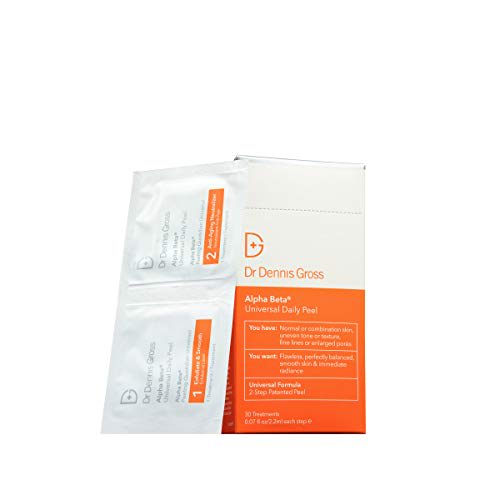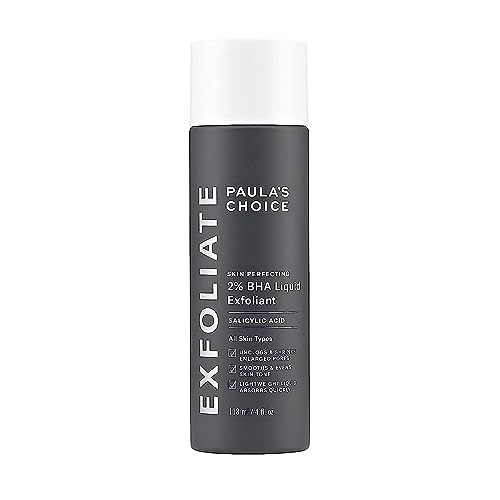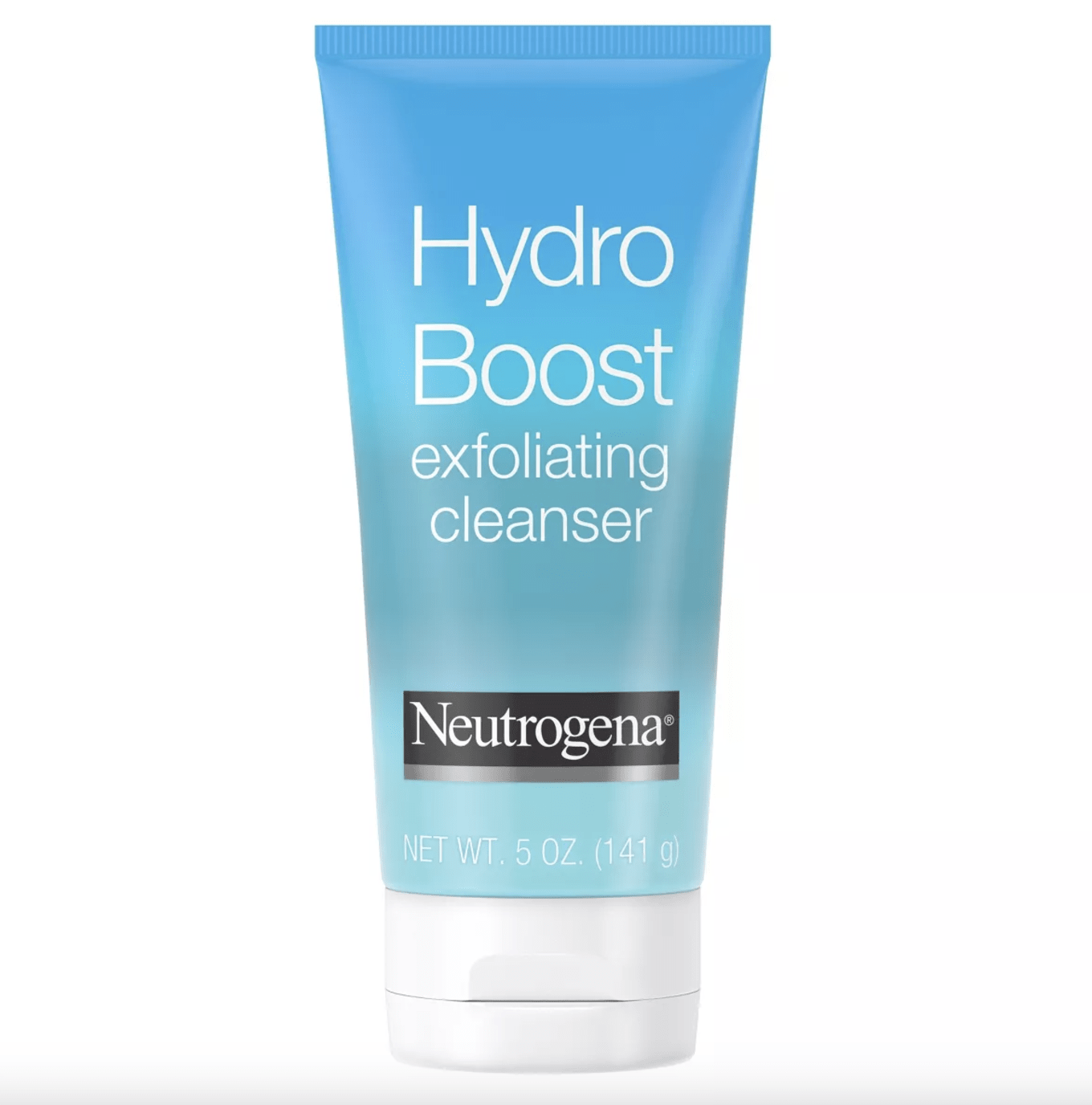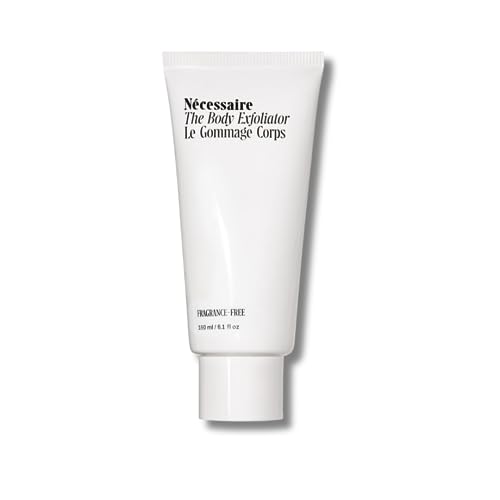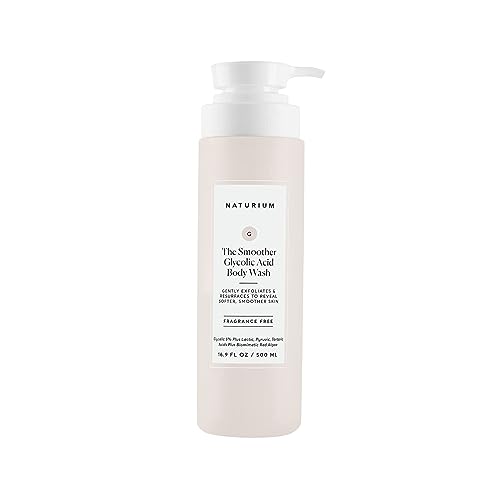Looking through the skin care aisle of your local retailer, you might see cleansers, body washes and face masks labeled as “exfoliating.” But what exactly does the term mean, and what does a proper exfoliating routine do for your skin?
Exfoliating is removing dead skin cells from the outermost surface layer of your skin, according to Dr. Shereen Idriss, a board-certified dermatologist in New York City. It can have several benefits, like leaving your skin looking even, smooth and soft, our experts say. A consistent exfoliating routine also cleans out oil and debris from your pores to prevent acne breakouts and stimulates cell turnover, which helps reduce the appearance of fine lines and wrinkles, says Idriss.
I spoke to board-certified dermatologists about how to shop for exfoliating products based on your skin type and craft a proper skin care routine for your face and body. I also compiled expert-recommended and NBC Select staff-favorite exfoliants to consider.
SKIP AHEAD How I picked the best exfoliating products | Best face exfoliators | Best body exfoliators | How to best exfoliate the face and body | Why trust NBC Select?
Selected.
Show 2 More
Show Less
How I picked the best exfoliating products
There are two types of exfoliants: physical and chemical. Physical exfoliants use abrasive particles or textured materials to scrub the surface of your skin, while chemical exfoliants rely on acids to dissolve dead skin, debris and more. Dermatologists prefer chemical exfoliants because they tend to be less harsh on the skin (more on that below). The experts I spoke to recommend using chemical exfoliants with the following ingredients:
- Alpha-hydroxy acids: Commonly known as AHAs, these acids are water-soluble chemical compounds that help remove dead skin cells, says Idriss. These acids help exfoliate the top layer of the skin. Some common AHAs are glycolic, lactic and mandelic acid.
- Beta-hydroxy acids: These acids, known as BHAs, are organic oil-soluble compounds that exfoliate the skin, replace old skin cells, remove excess oil and have anti-inflammatory properties, according to experts. Salicylic acid is the most common BHA found in skin care products.
- Poly-hydroxy acids: Like AHAs, PHAs are chemical exfoliants that help remove dead skin cells by unclogging pores. They are hydrating and larger in molecular size compared to AHAs or BHAs, so they work on the skin’s surface and don’t penetrate pores as deeply as other acids do. This makes them more gentle and suitable for sensitive skin since they cause less irritation, experts say. Common PHAs in skin care products include gluconolactone, lactobionic and maltobionic acid.
Want more from NBC Select? Sign up for our newsletter, The Selection, and shop smarter.
The best exfoliating products of 2025
Below are dermatologist-recommended and NBC Select staff-favorite products that contain exfoliating ingredients like AHAs and BHAs and are in line with experts’ guidance. Although some of these products may be safe for daily use, experts recommend exfoliating one to three times a week.
Best face exfoliators
Best powder: Dermalogica Daily Microfoliant Exfoliator
This powder-turns-paste daily exfoliant helps improve dull skin, even tone and texture, and combat breakouts, including blemishes and blackheads, according to the brand. “There’s a reason I wrote an ode to Dermalogica’s Daily Microfoliant: It does a great job of evening out my skin texture and leaving it with a super soft feel after a shower,” says Fernandez. It uses ingredients like rice-based powder, colloidal oatmeal and salicylic acid more to achieve these results.
Best peel: Dr. Dennis Gross Skincare Alpha Beta Universal Daily Peel Pads
This peel has ingredients like lactic and malic acid to even out skin tone, glycolic acid to reduce the appearance of fine lines and salicylic acid to exfoliate, reduce buildup of excess oil and combat acne, according to the brand. “Unlike other exfoliating peels, which you should limit using to two to three times per week depending on your skin, you can use this two-step chemical peel daily because this peel does not have mandelic (AHA) or Salix Alba (BHA) acids,” says Dr. Stephen Suah, a board-certified dermatologist at Foxhall Dermatology in Washington, D.C. “It is much gentler for people with mild acne/combination skin.”
These daily peels are also available in two other versions, including an ultra-gentle version (which Suah recommends for those with dry or sensitive skin) and an extra-strength version.
Best face mask: Philosophy Purity Made Simple Pore Extractor Exfoliating Clay Mask
As a weekly treatment in her skin care routine, NBC Select associate updates editor Zoe Malin incorporates this clay mask to unclog pores and reduce their appearance. It can do this because salicylic acid is one of its main ingredients. Apply a dime-size amount to the areas you want to target and rinse after leaving it on for five to ten minutes, according to Philosophy.
Best cleanser: Neutrogena Hydro Boost Exfoliating Cleanser
(Note: Amazon price is for a 3-pack.)
This cleanser helps gently exfoliate the skin while also combating dryness, a common side effect of using AHAs, according to Suah. The gel-cream cleanser uses glycolic and lactic acid as its exfoliating agents, as well as hyaluronic acid and glycerin to lock and seal in hydration, according to Neutrogena.
Best splurge: Tata Harper Regenerating Cleanser
“This is the best exfoliator I’ve ever used hands-down,” says NBC Select commerce editor Lindsay Schneider, who received a courtesy sample from the brand. “It’s the milkiest, creamiest formula — I barely ever feel the little exfoliating beads, and my skin has genuinely never been softer.”
Despite its higher price point, Schneider says this is absolutely worth the money. “I wish I could bottle this and give it to everyone; it’s the gentlest exfoliator ever.”
Best exfoliating pads: First Aid Beauty Facial Radiance Pads
Because I have eczema and sensitive skin, I typically go light on exfoliating products — these gentle pads are an exception. They effectively even out my skin’s texture and minimize the appearance of pores on my nose without causing irritation. The pads come saturated in a solution with chemical exfoliants (glycolic and lactic acid) as well as soothing and hydrating ingredients like hyaluronic acid, aloe and cucumber water, according to the brand.
Best toner: Paula’s Choice 2% BHA Liquid Exfoliant
This liquid exfoliant has 2% salicylic acid, the standard percentage of the BHA in most skin care products, according to our experts. The exfoliant, recommended by Suah, is suitable for all skin types and helps unclog pores and smooth fine lines, according to the brand.
“I can actually notice a difference in the size of my pores after using this product a few times,” says NBC Select commerce editor Cory Fernandez. “It also doesn’t sting or irritate my seborrheic dermatitis at all, which is always a plus.” For the best results, use your fingertips or a lightly soaked cotton pad, apply the liquid to your face and neck and leave it on without rinsing, according to Paula’s Choice.
Best for beginners: Glow Recipe Watermelon Glow PHA + BHA Pore-Tight Toner
Formulated with a combination of PHAs and BHAs, this toner is a great option for beginners who are just starting out with chemical exfoliants because it’s gentle on the skin, says Dr. Liza Moore, a board-certified dermatologist in Tysons, Virginia. PHAs like gluconolactone help give the skin more time to react to its exfoliating benefits because of how big they are on a molecular level, making it sensitive and skin-friendly, according to the brand. Aside from the chemical exfoliants in the formula, it also has ingredients like hyaluronic acid to hydrate and retain moisture and tea tree extract to help reduce irritation, according to Glow Recipe.
Best facial scrub: Skinceuticals Micro-Exfoliating Scrub
If you prefer a physical scrub, Suah recommends this micro-exfoliating option from Skinceuticals. According to the brand, this product uses silica (a naturally occurring mineral) to remove dead skin cells, debris and excess oil and help smooth and soften the skin. Apply a small amount of the scrub to wet skin and gently massage for a minute before rinsing.
Best polish: Dr. Loretta Resurfacing Enzyme Polish
To give her skin a deep clean, Schneider loves using this exfoliator (which the brand sent her as a courtesy sample) in the shower and as a face mask when she shampoos or conditions her hair. “It’s not too stripping or harsh on my sensitive skin, which is really key for me,” she says. The polish uses physical and chemical exfoliants to brighten skin tone, improve fine lines and remove dead skin, according to the brand.
Best treatment: Sunday Riley Good Genes All-In-One Lactic Acid Treatment
This overnight serum from Sunday Riley is a favorite of Suah’s because it uses lactic acid to hydrate, exfoliate and help with discoloration, while ingredients like licorice and lemongrass even out your skin tone. To use it as a leave-on treatment, apply one to two pumps on clean, dry skin before bed. If you have sensitive skin, you should leave it on for 15 minutes before rinsing it off and patting your skin dry, according to the brand.
Best serum: iS Clinical Active Serum
Although this serum is suitable for all skin types, it’s a great option for oily skin since the combination of acids helps control both oil and acne, says Moore. It has AHAs like sugarcane and bilberry to exfoliate, as well as white willow bark, a BHA that goes deep into the pores to remove any oil, debris and dead skin cells found inside, according to the brand. For the best results, apply three to four drops on your hand and dab the serum on your face using your fingertips, according to iS Clinical.
Best gel: Differin Adapalene Gel
Unlike other exfoliating products on this list that have acids, this gel uses a type of retinoid called adapalene to unclog pores, target acne and improve tone and texture. “[It’s] a great one to get something milder than what you get at a doctor’s office but also going to make a difference in your skin’s appearance over time,” says Moore.
Best moisturizer: Skinbetter Science AlphaRet Overnight Cream
This night cream is another favorite of Moore’s because it combines the brand’s lactic acid and retinol blend with glycolic acid to reduce the appearance of texture, fine lines and wrinkles. To combat any dryness from the retinol and AHAs, it also has hydrating ingredients like hyaluronic acid, ceramides and squalane, according to the brand. This formula is available in different sizes, concentrations and consistencies, including serum and chemical peel versions.
Best body exfoliators
Best body wash: Naturium The Smoother Glycolic Acid Exfoliating Body Wash
This fragrance-free body wash combines five AHAs, including glycolic, malic and lactic acid, to exfoliate and remove dead skin cells. I use this creamy wash three times a week and find that it’s gentle on my sensitive and eczema-prone skin. Apply as many pumps as you need to coat your entire body and gently massage it into your skin, according to the brand. On the days I have extra time, I always leave the wash on my skin for a few minutes before rinsing it off.
Best bar: Billie Body Buffer
Billie’s Body Buffer bar, which Malin recommends, uses plastic-free jojoba beads to exfoliate the skin physically. These beads are safe to use on all skin types because they have a rounded shape and won’t damage the skin, according to Moore. Aside from exfoliating, this Body Buffer also helps prevent ingrown hairs and hydrates the skin with ingredients like shea butter and aloe vera, according to the brand.
Best gentle scrub: Dove Exfoliating Body Polish
NBC Select updates editor Mili Godio uses this exfoliating body scrub three times a week in the shower and loves how smooth her skin feels afterward. “I’ve had trouble finding a body scrub that doesn’t irritate my sensitive skin in the past, but this Dove one fits the bill,” she says. “I love how gentle it feels on my skin and the scent is pleasing yet subtle.” Not only does this polish remove dead skin with the help of crushed macadamia, but it’s also hydrating since it’s formulated with the brand’s moisturizing cream, according to the brand. Massage the scrub in circular motions for a creamy lather and rinse, according to Dove.
Best body scrub: Nécessaire The Body Exfoliator
This physical exfoliant combines salicylic acid with AHAs like glycolic and lactic acid. “It doesn’t feel like it’s tearing out your skin like most coarse exfoliating products do,” says former NBC Select associate commerce editor Nishka Dhawan. The brand recommends using this product once a week and offers it in various essential oil blends to provide a subtle scent, including eucalyptus, bergamot and sandalwood.
Best body lotion: Paula’s Choice Weightless Body Treatment 2% BHA
This fragrance-free body lotion is recommended by NBC Select associate reporter Ashley Morris because the leave-on treatment uses salicylic acid to unclog pores and help even out any texture. It also contains vitamin E to hydrate the skin and protect it from free radicals, as well as chamomile and green tea to help calm irritation, according to the brand.
Best for keratosis pilaris: First Aid Beauty KP Bump Eraser Body Scrub
This body scrub, which has a 4.4-star average rating from over 36,000 reviews on Amazon, is a great option for most skin types and concerns, including rough, bumpy skin caused by keratosis pilaris. The scrub combines physical and chemical exfoliants into one product: The pumice buffing beads physically scrub away dead skin cells, while glycolic and lactic acids unclog pores. According to the brand, apply the scrub to wet skin and massage gently once to twice a week, depending on your skin’s tolerance level.
NBC Select updates editor Mili Godio uses this exfoliating body scrub three times a week in the shower and loves how smooth her skin feels afterward. “I’ve had trouble finding a body scrub that doesn’t irritate my sensitive skin in the past, but this Dove one fits the bill,” she says. “I love how gentle it feels on my skin and the scent is pleasing yet subtle.” Not only does this polish remove dead skin with the help of crushed macadamia, but it’s also hydrating since it’s formulated with the brand’s moisturizing cream, according to the brand. Massage the scrub in circular motions for a creamy lather and rinse, according to Dove.
How to exfoliate your face and body
Below, I list our experts’ tips to help you properly exfoliate your face and body. Before incorporating an exfoliant into your skin care routine, consult your dermatologist to determine if it’s a good fit and how often to exfoliate for your specific skin type.
- Face: Begin your skin care routine using a gentle cleanser that doesn’t have any active ingredients to avoid possible irritation, says Suah. Immediately after exfoliating with either a chemical or physical exfoliant, you want to repair the skin barrier with moisturizing ingredients like ceramides and hyaluronic acid. This prevents the skin from drying. According to Suah, these hydrating ingredients are found in skin care products like serums and moisturizers.
- Body: Like the face, you want to begin by cleansing the skin with gentle body wash. Next, apply your exfoliating product in the shower. Within three minutes of exiting the shower, you should apply a body lotion or barrier repair cream since exfoliating can draw out moisture, leaving your skin dry, according to Suah. You want to ensure your skin is slightly damp when applying your cream or lotion to help add and lock in moisture, says Suah.
Frequently asked questions
What’s the difference between chemical and physical exfoliants?
When shopping for exfoliating products, you may come across two main types: physical and chemical exfoliants.
- Physical exfoliants use sugars or beads to scrub away dead skin cells. This type of exfoliant can come in the form of scrubs or tools like brushes and exfoliating gloves, according to experts.
- Chemical exfoliants, on the other hand, use compounds like alpha-hydroxy acids, beta-hydroxy acids, poly-hydroxy acids and enzymes that penetrate the skin to dissolve or loosen the bonds between dead skin cells, says Idriss. These ingredients are found in skin care products like toners, serums, cleansers and moisturizers.
Which type of exfoliant is the safest?
Most dermatologists agree that using chemical exfoliants is the safest way to shed dead skin cells from your face because they can penetrate the skin more deeply than physical exfoliants and are not as harsh on your skin, says Idriss.
Dermatologists don’t generally recommend a physical scrub for your face because, in most instances, you're more likely to break down your skin barrier due to over-scrubbing. However, if you do choose to use a physical exfoliant for your face, look for round beads instead of triangular shaped ones, which might widen your pores. A benefit of exfoliating is minimizing the appearance of pores since you’re unclogging them, so widening them has the opposite effect, according to Moore. If you prefer to use a physical exfoliating tool like cleansing brushes, you should clean them nightly. You can use soap and water or UV light sanitation boxes that can disinfect skin care tools and prevent bacteria growth, according to our experts.
Although dermatologists recommend avoiding physical exfoliants on the face, they do agree it’s safe to use on the body because the skin is thicker. Dry brushing, loofahs, exfoliating gloves and coarse washcloths can be great options for the body because they remove layers of dead skin cells, according to our experts.
Who should exfoliate?
Exfoliation benefits all skin types. “It’s all about finding the right exfoliating product for your biggest skin concerns, like acne, hyperpigmentation, fine lines and wrinkles,” says Idriss. To ensure you are using the right ingredients for your skin type and concerns, consult your dermatologist first.
- Normal/combination skin: You may benefit from using your standard AHAs or BHAs like glycolic acid or salicylic acid.
- Oily or acne-prone skin: Look for products with salicylic acid, a type of BHA, because the ingredient is oil-soluble, helps unclog pores and removes excess oil, says Idriss.
- Sensitive skin: Consider PHAs like lactobionic acid or maltobionic acid because they are gentler and less irritating on the skin, experts say.
- Dry skin: This skin type should use glycolic acid and lactic acid as exfoliants because, in low concentrations, these acids are not drying and can help loosen and remove any dry or dead skin on the top of the skin, says Moore.
How often should you exfoliate your face?
Suah recommends exfoliating one to three times per week. Exfoliating more often can strip your skin of its natural moisture and oils, irritating and damaging your skin barrier over time. However, the frequency typically depends on your skin type.
If you have sensitive skin or a skin condition like rosacea or eczema, you should only aim to exfoliate once or twice a week to avoid irritation, says Moore. If you want to be more diligent with your exfoliating routine and your skin type can benefit from it (usually oily and acne-prone skin that’s more prone to clogged pores due to excess oil production), you can exfoliate your face three to four times a week, says Idriss. However, those interested in using a physical exfoliant on the face should limit usage to once or twice a week, according to Moore.
How often should you exfoliate your body?
The skin on your body can tolerate more frequent chemical and physical exfoliation than your face. Areas like the feet and the palms of your hands have a thicker layer of skin and can benefit from exfoliation every other day or even daily, says Suah. However, try to limit exfoliating your body to no more than five times a week to prevent the skin from drying out, according to Idriss.
When should you exfoliate your face and body?
Exfoliating acids might make your skin more sensitive to the sun, so it’s best to use these products at night before bed. According to Idriss, be sure to always incorporate sunscreen in your morning routine, especially after exfoliating the previous night.
Can you pair an exfoliant with other skin care ingredients?
You can pair exfoliants with other active ingredients, but keep in mind that certain ones, like retinol, may irritate your skin, according to our experts. If you plan on incorporating numerous actives in your routine, add them one at a time and see how your skin reacts, says Moore. One of the main things to remember is that you should try using exfoliating acids and retinoids on separate nights because it might cause excessive irritation and redness, says Idriss.
Is it possible to over-exfoliate?
Yes, it is possible to over-exfoliate. The key to exfoliating is to start gradually and not overdo it.
If you over-exfoliate, you can damage and irritate your skin barrier, causing it to become inflamed and stripped of its natural oils and moisture, according to our experts. “As you can imagine, over time, this barrier serves a purpose, and it can really leave your skin hanging out to dry, both literally and figuratively,” says Suah. “So that means you don't want to do it every single night, especially [not] right away.”
Meet our experts
At NBC Select, we work with experts with specialized knowledge and authority based on relevant training and/or experience. We also ensure all expert advice and recommendations are made independently and without undisclosed financial conflicts of interest.
- Dr. Shereene Idriss is a board-certified dermatologist and founder of Idriss Dermatology in NYC and is also the creator of the #PillowtalkDerm series on Instagram.
- Dr. Stephen Suah is a board-certified dermatologist at Foxhall Dermatology in Washington, DC.
- Dr. Liza Moore is a board-certified dermatologist and clinical director of Luxe Dermatology and Aesthetic Centers in Tysons, Virginia.
Why trust NBC Select?
I am an associate reporter at NBC Select who frequently covers skin care topics, like the best foot creams and retinol alternatives. For this article, I interviewed three dermatologists and researched many exfoliants on the market. I recommended products the dermatologists shared with me, met their shopping guidance and ones NBC Select staff have tried themselves.
{{data.menu.name}}
- {{#data.menu.menuItems}}
- {{text}} {{/data.menu.menuItems}}
Catch up on NBC Select’s in-depth coverage of tech and tools, wellness and more, and follow us on Facebook, Instagram, Twitter and TikTok to stay up to date.
